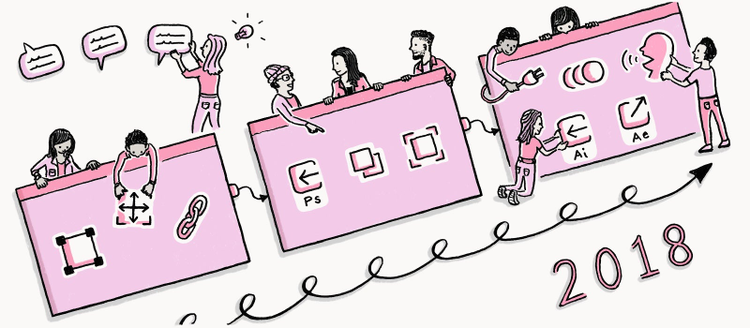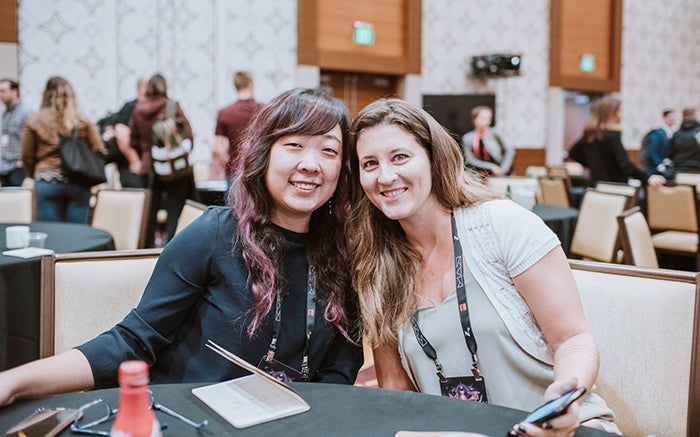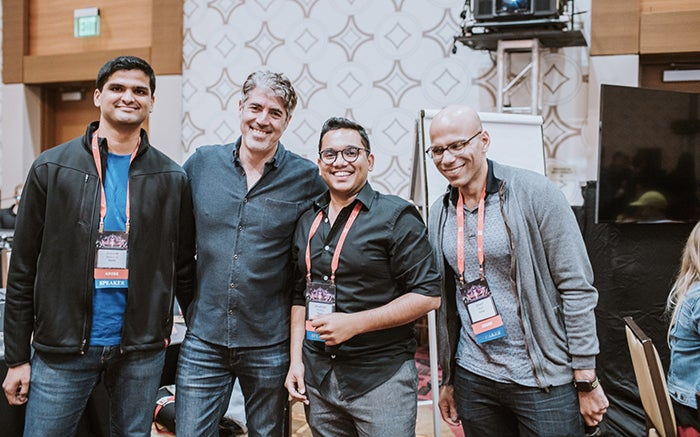Adobe XD in 2018: How We’re Crafting a Powerhouse Product for an Engaged Community

Illustration: Justin Cheong.
As 2018 draws to a close, we’re taking a moment to reflect on the past year and look forward to 2019. When I was tasked with collecting the best moments of this twelve months and sharing with the world how Adobe XD has changed, all I came up with at first was, “Wow.” I’m truly in awe of what the team has accomplished together with the UX design community, as we’ve made great strides in developing our vision of an all-in-one design and prototyping platform in just a year.
XD in 2018: Incredible, incremental progress
This past year, we’ve made some significant improvements in key areas of the product that have unlocked the expressiveness UX designers have been asking for from Adobe XD.
Prototyping took a huge leap forward in 2018, starting with Preserve Scroll Position in February and Overlays and Fixed Elements in June. You were able to use these three features together to create more realistic experiences when switching between artboards, enabling the simulation of states and allowing the reusability of visual components like keyboards and menus. In October, XD took another massive leap forward with the introduction of Auto-Animate and voice prototyping, both of which empowered you to create more immersive experiences.

Playing with XD’s awesome new features in a Creative Jam at MAX 2018. Image credit: Evan Yamada.
Extensibility also launched in 2018, starting with third-party integrations with key partners at the beginning of the year and culminating with our release of XD plugins in October. We launched with twenty plugins, but doubled that within a couple of weeks. Plugins are being submitted on a regular basis now, and already you have access to a huge selection of them (over 70!) to enhance your design experience.
You’re now also able to leverage the power of the rest of the Creative Cloud. In February, we expanded Creative Cloud Libraries to include vector objects, then enabled Photoshop file import in March and Illustrator file import in October. But we weren’t just focused on the import of assets; we delivered an export to After Effects feature in October for those who really wanted a high fidelity of control over their animations.
But the themes above only represent a fraction of the new features that were released across the entire platform to improve both XD’s utility and usability. From Design Specs to private invitations, paste interaction to responsive resize, XD has grown every month to the powerhouse product it is today.
In some ways, it’s been like watching a child grow — from day to day, XD hasn’t looked that different, but when you look at a year’s growth, it’s amazing. Releasing incrementally has given XD a sense of momentum, but we’re not planning to stop here; instead of resting on our laurels, we’re more determined than ever to increase the expressiveness, power, and utility of XD while maintaining the quality and performance we’re known for.

Top UX designers gather at Adobe’s UX Leader’s Summit at Adobe MAX. Image credit: Evan Yamada.
A UX platform built with the UX community
None of this would have been possible without you, the UX community. Our team has traveled far and wide to meet with designers around the world to discover what problems you’re facing, how you’re solving them, and what friction you’re experiencing in your day to day workflow. Our product team — from interns to senior directors, including product managers, designers, and engineers — is active on social media almost every day, celebrating your victories and listening to your pain. Furthermore, thousands of you have been logging into our UserVoice site and our product forum to give us feedback on what features you’d like to see in XD.
The community has been steadily growing, and thanks to the Starter plan announced in May (which lets you use XD for free), it now consists of an incredibly diverse set of designers from all walks of life, including those still exploring the field. As a result of your thoughtful and constructive feedback, we’re getting a much more nuanced view of which features and additions will make the greatest impact for all of you.

Consulting the community at the UX Leader’s Summit at MAX 2018. Image credit: Evan Yamada.
The excitement and passion we see in the community fuels our own, and our whole team feels incredibly privileged to have such a deep involvement with you. We’re thankful that you’ve chosen to join us in this journey of creating a cutting-edge design platform. We couldn’t do it without you.
Built by a team
Finally, I want to recognize that this year would not have been possible had it not been for our team. Our entire organization — from designers to engineers to product to the people who keep the entire organism running — has grown and matured in this past year, and we’re still maintaining the same vision we had when we wrote the first line of production code a few years ago: to create a first-class experience for our community.

Some of the members of the Adobe XD team at the UX Summit. Image credit: Evan Yamada.
As I look back on how we grew from a tiny team that could all fit in a single small conference room to a vibrant organization that is thoughtfully crafting solutions for modern design problems, I’m constantly impressed by the way this diverse, talented group of people comes together every single day to collaborate, iterate, and learn. In many ways, for me, this has been one of the great privileges and successes of this year.
And we’re not done
While we see 2018 as pivotal in Adobe XD’s growth as a product, this is really just the beginning. As much as it seems like XD has been in the market forever, we’re only just over a year out from our 1.0. We’re grateful for the opportunity to build a solid platform from which to grow and for the community that surrounds us, supports us, and cheers us on. We’re looking forward to another exciting year in 2019, where together we’ll make the world a better place, one design at a time.